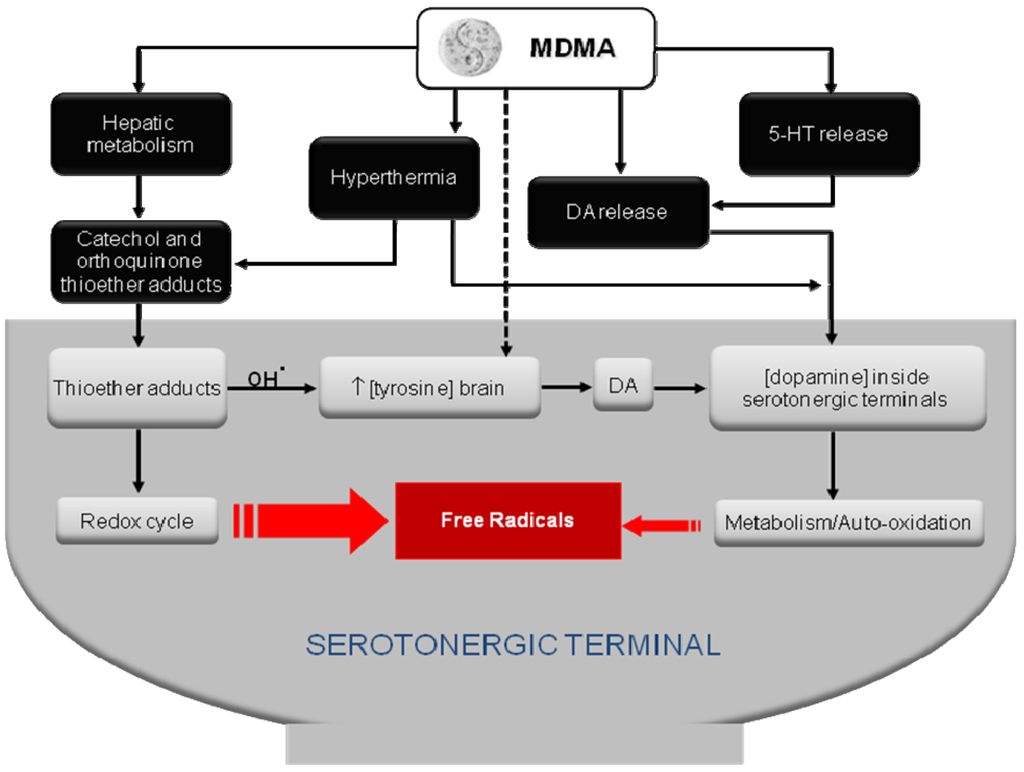tl;dr: Be careful, at consistent and high dosage, amphetamines can be neurotoxic resulting in diminished Dopamine receptors and higher chance for psychosis.
I've actually looked into this a bunch when I was coming off amphetamine sulfate last year. Here is an awesome paper that covers almost every aspect of amphetamine use in a strictly scientific manner. The vocabulary can get a bit heavy but really worth looking through if you are a chronic user. I'll highlight the relevant parts.
Basic intro, comparison to documented cocaine use
Sustained high-dose administration of amphetamines (especially methamphetamine) to experimental animals produces a persistent depletion of DA which is associated with terminal degeneration (62, 182, 195), as well as neuronal chromatolysis in the brain stem, cortex and striatum (42, 182). In contrast, continuous dosing with extremely high doses of cocaine (100–250 mg/kg/day i.v.) did not induce terminal degeneration in frontal cortex and striatum (62, 183). Recently, Cubellis et al. (36) presented evidence that amphetamine, in contrast to cocaine, induces redistribution of DA from the vesicles into the cytosol; thus, the loss of the protection of the vesicles' relatively reducing environment results in cytosolic oxidative stress that may initiate amphetamine neurotoxicity. The DA depletion is reported to be permanent in the caudate of monkeys (196). The main hypotheses for underlying mechanisms have included 1) the conversion of DA into a hydroxy oxidative metabolite (195, 196); and 2) glutaminergic stimulation of toxicity, which can be inhibited by N-methyl-D-aspartate antagonist MK-801 (200).
Effects of NeuroToxicity
One of the hallmarks of amphetamine-induced neurotoxicity is the loss of DA uptake sites in the striatum and accumbens. These studies of transporters after chronic amphetamine have reported decreases in the range of 30–40% (158). ... Thus, the amphetamine-induced loss of DA uptake sites could have two consequences: 1) a protective mechanism reducing further neurotoxicity, and 2) reverse tolerance to subsequent amphetamine administration, perhaps resulting in adverse symptoms such as paranoid psychosis
Characteristics of Neurotoxicity
These marked neurotoxic effects on the DA systems may underlie the mild Parkinson-like symptoms or "burned out" clinical picture in chronic, high-dose amphetamine abusers. These same individuals have a readily activated stimulant psychosis response
Dose-dependence of neurotoxicity
...amphetamine pretreatment induced neurotoxicity in a dose-dependent manner, while cocaine, even at very high doses, did not. Following continuous methamphetamine or amphetamine infusion via Alza pumps, Ricuarte et al. (173) and Ryan et al. (182) found silver staining histopathological evidence for caudate neurotoxicity at doses above 16–20 mg/kg/day; no significant toxicity was observed at lower doses.
Wikipedia states,
"In rodents and primates, sufficiently high doses of amphetamine cause dopaminergic neurotoxicity, or damage to dopamine neurons, which is characterized as reduced transporter and receptor function.[83] There is no evidence that amphetamine is directly neurotoxic in humans.[84][85] High-dose amphetamine can cause indirect neurotoxicity as a result of increased oxidative stress from reactive oxygen species and autoxidation of dopamine."
The problem is, there is no strong consensus on the neurotoxicity of amphetamines due to the inaccuracy of scaling its effects on rats and primates to humans. The paper that I referenced, tends to not delineate the results of studies to humans or animals. If you read my quotes in context of the paper, you can get a clearer idea.
My opinion on the matter: The Wikipedia section on the matter seems to downplay the neurotoxicity through the connotation of "indirect." I think that neurotoxicity is dependent on dose (supported by the paper) and is pretty destructive. However, I'm unsure of what dosage begins this neurotoxicity. I assume it is normally distributed on the population and might be slightly affected by tolerance (which the paper goes into).
EDIT: To add the section,
Prevention
Methamphetamine toxicity is inhibited by a variety of drug treatments, including: 1) DA synthesis inhibitor alpha-methyl-para-tyrosine; 2) DA receptor antagonists; 3) NMDA receptor antagonists, e.g., MK-801; 4) DA and serotonergic reuptake inhibitors protecting against DA and serotonin toxicity respectively (195). Even though most studies have found that serotonergic and DA reuptake inhibitors specifically protect these two sites, certain reuptake blockers (such as benztropine) do not (195). On the other hand, mazindol, a non-specific blocker, protects against both DA and serotonergic neurotoxicity.
I know that is meth, but still. You should also be fine as long as you don't take around 120 mg a day +-20 mg per body weight.



























































